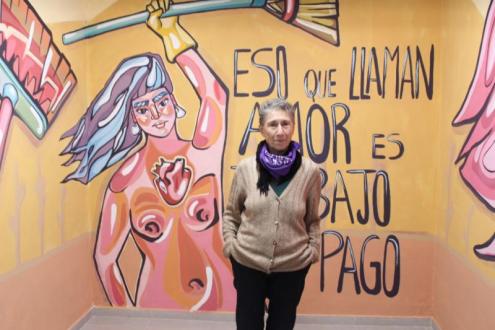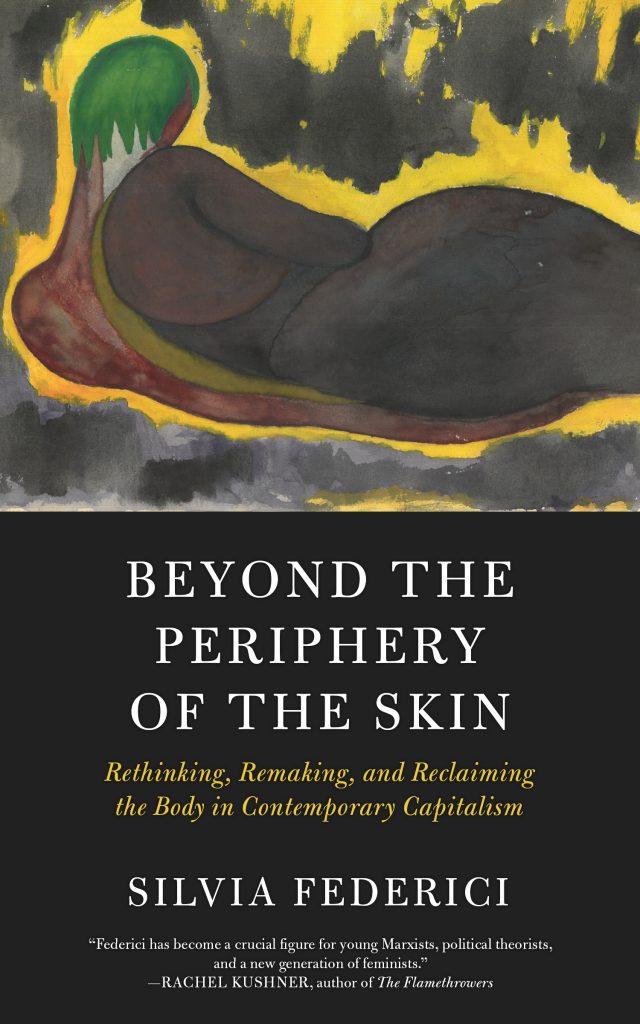The Commoner
June 17th, 2020
Silvia Federici is a feminist activist, writer, and a teacher. In 1972 she was one of the cofounders of the International Feminist Collective, the organization that launched the Wages For Housework campaign internationally. In the 1990s, after a period of teaching and research in Nigeria, she was active in the anti-globalization movement and the U.S. anti–death penalty movement. She is one of the co-founders of the Committee for Academic Freedom in Africa, an organization dedicated to generating support for the struggles of students and teachers in Africa against the structural adjustment of African economies and educational systems.
From 1987 to 2005 she taught international studies, women studies, and political philosophy courses at Hofstra University in Hempstead, NY. All through these years she has written books and essays on philosophy and feminist theory, women’s history, education and culture, and more recently the worldwide struggle against capitalist globalization and for a feminist reconstruction of the commons – from Silvia’s author page with PM Press which is a treasure trove of links to interviews, talks, videos, articles, books and more.

In her book Caliban and the Witch: Women, The Body and Primitive Accumulation (Autonomedia, 2004) … Silvia … considers the killing of witches as foundational of a capitalist system that domesticates women, imposing on them the reproduction of the workforce as forced labor without any remuneration. It is in the mode of development of this reproductive work that Federici locates a central terrain of struggle for the women’s movement.
This is not a fairytale, nor is it simply about witches. Witches expand into other female and closely related characters: the heretic, the healer, the midwife, the disobedient wife, the woman who dares to live alone, the obeah woman (a practitioner of secret magic) who poisoned the food of the master and inspired slaves to rebel. Capitalism, from its origins, persists and combats these women with fury and terror – from Witchtales: An Interview with Silvia Federici
Silvia has been a regular contributor to The Commoner and her work has featured in six issues and beyond:
- Silvia Federici (1974): Wages Against Housework [PDF]
- Silvia Federici (1975): On Sexuality as Work [PDF]
- Silvia Federici: On Elder Care [PDF]
- from Issue 15: Winter 2012: ‘Care Work and the Commons’
- Silvia Federici and George Caffentzis: Notes of the edu-factory and cognitive capitalism [PDF]
- from Issue 12: Spring/Summer 2007: ‘Value strata, migration and “other values”‘
- Silvia Federici: The Restructuring of Social Reproduction in the United States in the 1970s [PDF]
- from Issue 11: Spring/Summer 2006: ‘Re(in)fusing the commons’
- Silvia Federici: Women’s Land Struggles and the Valorization of Labour [PDF]
- from: Issue 10: Spring/Summer 2005: ‘The Carnival of Values and The Exchange Value of Carnival’
- Silvia Federici: The Great Caliban: The Struggle Against the Rebel Body [PDF]
- from: Issue 03: January 2002 ‘Reclaiming the Body’
- Silvia Federici: Debt crisis, Africa and the new enclosures [PDF]
- from: Issue 02: September 2001: ‘Enclosures, the Mirror Image of Alternatives’
- Silvia Federici: War, Globalization, and Reproduction [PDF]
- from Issue 01: May 2001: ‘untitled’ – each article with its own added title, this one: ‘War is on the agenda’
- Silvia Federici: Witch-Hunting, Globalization, and Feminist Solidarity in Africa Today [PDF]
- Silvia Federici: Feminism And the Politics of the Commons [PDF]
- two articles that appeared in ‘the editor’s blog’ on the old website

Caliban and the Witch is a history of the body in the transition to capitalism. Moving from the peasant revolts of the late Middle Ages to the witch-hunts and the rise of mechanical philosophy, Federici investigates the capitalist rationalization of social reproduction. She shows how the battle against the rebel body and mind are essential conditions for the development of labor power and self-ownership, two central principles of modern social organization.
“In the neoliberal era of postmodernism, the proletariat is whited-out from the pages of history. Federici recovers its historical substance by telling its story starting at the beginning, with the throes of its birth. This is a book of remembrance, of a trauma burned into the body of women, which left a scar on humanity’s memory as deep and painful as those caused by famine, slaughter, and enslavement.” —Peter Linebaugh
Publisher: Autonomedia
Binding: pb
Pages: 288
Released: January 10, 2004
ISBN-13: 9781570270598
I don’t know how many copies Autonomedia has sold of Federici’s treasured book Caliban and the Witch: Women, the Body and Primitive Accumulation, but I doubt that would give even a remote estimate of how many have read it. I’ve seen xeroxed copies stacked in infoshops, PDFs shared online, earmarked copies read out loud during road trips and passed among friends like a secret, sacred text. Many know it simply as ‘the book about the witch hunts,’ and this might make its lasting significance seem perplexing. But it’s not just about the witch hunts. Rather, it’s a historic overview of how capitalism emerged and spread – from ‘Sipping Tea with Silvia Federici: What is the deal with that book about the witch hunts, though?‘ in which Hanna Hurr sits down with Silvia Federici, the mother of materialist feminism and author of Caliban and the Witch, to discuss the lessons we still have to learn from Wages for Housework and other organizing around reproductive labor.
Nevertheless, the Promethean view of technological development that Marx and the entire Marxist tradition have promoted, far from losing its attraction, is making a comeback, with digital technology playing for some the same emancipatory role that Marx assigned to automation, so that the world of reproduction and care work – that feminists have valorised as the terrain of transformation and struggle – is risking being again overshadowed by it. This is why, though Marx devoted limited space to gender theories in his work, and presumably changed some of its views in later years, it remains important to discuss them and to stress that his silences on this matter are not oversights, but the sign of a limit his theoretical and political work could not overcome but ours must – from Marx and Feminism, by Silvia Federici, December 25, 2019
Praise of each of these books – from left to right:
Patriarchy of the Wage: Notes on Marx, Gender, and Feminism:
“Federici has become a crucial figure for young Marxists, political theorists, and a new generation of feminists.”
—Rachel Kushner author of The Flamethrowers
“Real transformations occur when the social relations that make up everyday life change, when there is a revolution within and across the stratifications of the social body. . . . Silvia Federici offers the kind of revolutionary perspective that is capable of revealing the obstacles that stand in the way of such change.”
—Feminist Review
Beyond the Periphery of the Skin: Rethinking, Remaking, and Reclaiming the Body in Contemporary Capitalism:
“Federici’s attempt to draw together the work of feminists and activists from different parts of the world and place them in historical context is brave, thought-provoking, and timely. Federici’s writing is lucid and her fury palpable.”
—Red Pepper
“Reading Federici empowers us to reconnect with what is at the core of human development, women’s labor-intensive caregiving—a radical rethinking of how we live.”
—Z Magazine
Re-enchanting the World: Feminism and the Politics of the Commons:
“Silvia Federici’s theoretical capacity to articulate the plurality that fuels the contemporary movement of women in struggle provides a true toolbox for building bridges between different features and different people.”
—Massimo De Angelis, professor of political economy, University of East London
“Silvia Federici’s work embodies an energy that urges us to rejuvenate struggles against all types of exploitation and, precisely for that reason, her work produces a common: a common sense of the dissidence that creates a community in struggle.”
—Maria Mies, coauthor of Ecofeminism
Witches, Witch-Hunting, and Women:
“It is good to think with Silvia Federici, whose clarity of analysis and passionate vision come through in essays that chronicle enclosure and dispossession, witch-hunting and other assaults against women, in the present, no less than the past. It is even better to act armed with her insights.”
—Eileen Boris, Hull Professor of Feminist Studies, University of California, Santa Barbara
“Silvia Federici’s new book offers a brilliant analysis and forceful denunciation of the violence directed towards women and their communities. Her focus moves between women criminalized as witches both at the dawn of capitalism and in contemporary globalization. Federici has updated the material from her well-known book Caliban and the Witch and brings a spotlight to the current resistance and alternatives being pursued by women and their communities through struggle.”
—Massimo De Angelis, professor of political economy, University of East London
Revolution at Point Zero: Housework, Reproduction, and Feminist Struggle, 2nd Edition:
“Finally we have a volume that collects the many essays that over a period of four decades Silvia Federici has written on the question of social reproduction and women’s struggles on this terrain. While providing a powerful history of the changes in the organization of reproductive labor, Revolution at Point Zero documents the development of Federici’s thought on some of the most important questions of our time: globalization, gender relations, the construction of new commons.”
—Mariarosa Dalla Costa, coauthor of The Power of Women and the Subversion of the Community and Our Mother Ocean
“As the academy colonizes and tames women’s studies, Silvia Federici speaks the experience of a generation of women for whom politics was raw, passionately lived, often in the shadow of an uncritical Marxism. She spells out the subtle violence of housework and sexual servicing, the futility of equating waged work with emancipation, and the ongoing invisibility of women’s reproductive labors. Under neoliberal globalization women’s exploitation intensifies—in land enclosures, in forced migration, in the crisis of elder care. With ecofeminist thinkers and activists, Federici argues that protecting the means of subsistence now becomes the key terrain of struggle, and she calls on women North and South to join hands in building new commons.”
—Ariel Salleh, author of Ecofeminism as Politics: Nature, Marx, and the Postmodern
“The zero point of revolution is where new social relations first burst forth, from which countless waves ripple outward into other domains. For over thirty years, Silvia Federici has fiercely argued that this zero point cannot have any other location but the sphere of reproduction. It is here that we encounter the most promising battlefield between an outside to capital and a capital that cannot abide by any outsides. This timely collection of her essays reminds us that the shape and form of any revolution are decided in the daily realities and social construction of sex, care, food, love, and health. Women inhabit this zero point neither by choice nor by nature, but simply because they carry the burden of reproduction in a disproportionate manner. Their struggle to take control of this labor is everybody’s struggle, just as capital’s commodification of their demands is everybody’s commodification.”
—Massimo De Angelis, author of The Beginning of History: Values, Struggles, and Global Capital
“In her unfailing generosity of mind, Silvia Federici has offered us yet another brilliant and groundbreaking reflection on how capitalism naturalizes the exploitation of every aspect of women’s productive and reproductive life. Federici theorizes convincingly that, whether in the domestic or public sphere, capital normalizes women’s labor as ‘housework’ worthy of no economic compensation or social recognition. Such economic and social normalization of capitalist exploitation of women underlies the gender-based violence produced by the neoliberal wars that are ravaging communities around the world, especially in Africa. The intent of such wars is to keep women off the communal lands they care for, while transforming them into refugees in nation-states weakened by the negative effects of neoliberalism. Silvia Federici’s call for ecofeminists’ return to the Commons against Capital is compelling. Revolution at Point Zero is a timely release and a must read for scholars and activists concerned with the condition of women around the world.”
—Ousseina D. Alidou, Committee for Academic Freedom in Africa (CAFA), Director of the Center for African Studies at Rutgers University and author of Engaging Modernity: Muslim Women and the Politics of Agency in Postcolonial Niger
















